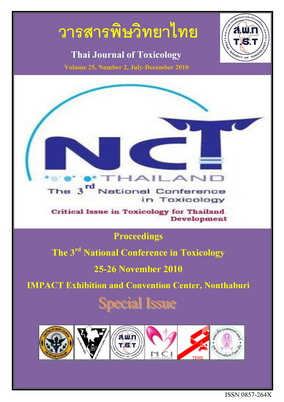Occupational Risk Factors for Nasopharyngeal Carcinoma in Ubon Ratchathani
Main Article Content
Abstract
Nasopharyngeal carcinoma (NPC) is rare in most populations around the world but common in Southern China and Southeast Asia. The marked geographic variation in incidence rates suggests that environment factors, particulary occupational exposures, may play a role in the etiology of disease. The purpose of this study was to evaluate the risk of NPC in different occupational categories. This case-control study was conducted at Ubonratchathani Cancer Center during October 2007- October 2009. Seventy two patients with histopathologically confirmed NPC and 96 controls were included in the study. Information was collected by interviewer about demographic variables including cigarette smoking, alcohol drinking, eating habits, past history of disease, family history of cancer and a lifetime history of every job held for one year or longer. A significant increased risk of NPC was observed among carpenters (OR=4.0, 95%CI 1.40-11.32). Working in public or private sector as administrator or clerk was associated with a decreased risk of NPC (OR=0.2, 95% CI 0.08-0.55). Subjects who were exposed to wood dust were at a 6 time excess risk of disease in relation to those never exposed (OR=6.0, 95% CI 1.54-23.56). For formaldehyde, a non significant increased risk of NPC was observed (OR=1.9, 95%CI 0.93-3.78). By contrast, there was no association between potential exposure to solvents and NPC (OR=1.5, 95% CI 0.76-3.08). However, occupational exposure to solvents for more than 5 years was associated with an increased risk of NPC (OR=2.4, 95%CI 1.21-4.85). This study support previous findings that some ocupational exposures such as wood dust, formaldehyde, or solvents may increase risk of NPC. Further studies with larger sample size is suggested to confirm these findings.


